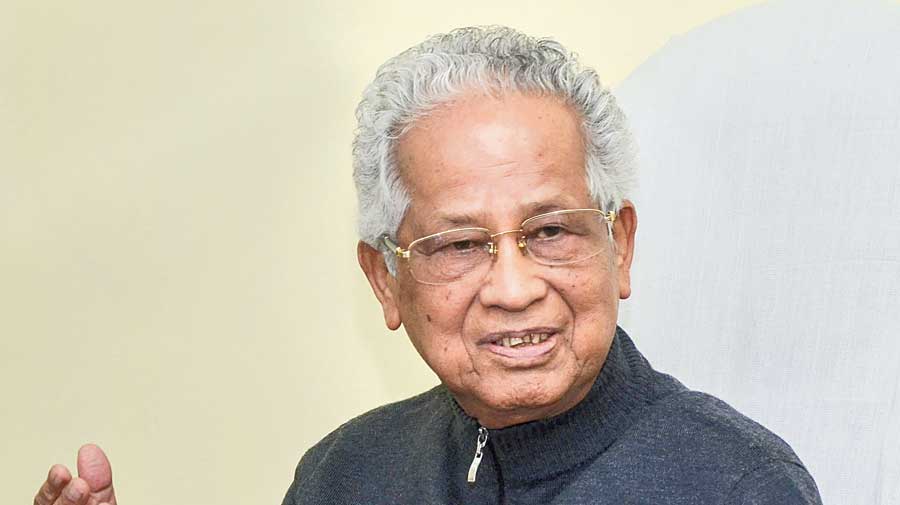Tarun Gogoi, Assam’s longest-serving chief minister who had helped the state “breathe freely again” after years of insurgency, died of post-Covid complications at the Guwahati Medical College Hospital on Monday evening. He was 86.
Health minister Himanta Biswa Sarma’s announcement of the death around 5.36pm triggered mourning across political barriers for a Congress leader widely described as a “towering” personality and able administrator whose sense of humour allowed him to enjoy even comedy shows lampooning him.
Tributes poured in from President Ram Nath Kovind, Prime Minister Narendra Modi, Congress leaders Sonia Gandhi and Rahul Gandhi, Assam governor Jagdish Mukhi and BJP chief minister Sarbananda Sonowal. Social media was alight with accolades.
Three days of state mourning have been announced for the man who ruled Assam from 2001 to 2016, with both the ruling BJP and the Opposition Congress cancelling all their programmes.
“If Laluji (former Bihar chief minister) gave voice to the downtrodden and the oppressed, Gogoi Sir delivered Assam from fear and uncertainty, fuelled by years of insurgency,” Assam Christian Forum spokesperson Allen Brooks said.
“Under him, life returned to normal in the villages and people began stepping out of their homes at night. The development that took place on (Guwahati’s) G.S. Road in his first term, and then the holding of the National Games in Guwahati during his second term, are testimonies to peace and development. He helped Assam breathe freely again.”
Columnist Paresh Malakar ageed. “Compared with what Gogoi had inherited, his achievements are remarkable,” he said.
“After Bimala Prasad Chaliha (Congress chief minister, 1957-70), Gogoi was the only chief minister under whom Assam witnessed real development. He also tried to preserve the composite character of Assam by taking everyone along.”
Educationist and theatre activist Sitanath Lahkar highlighted a different side of Gogoi’s rule.
“I’m not a fan of the Congress but I must admit that drama activists like me enjoyed a lot of freedom during his tenure. Freedom of expression was never curbed (unlike) what we are witnessing across India today,” he said.
Lahkar recalled the popular TV comedy show, Supati, “where the joke was always on him (Gogoi)”.
“But instead of taking umbrage, he used to enjoy the show,” he said, remembering how the chief minister used to break into a grin every time someone asked him about the show.
Rights activist Suhas Chakma saluted Gogoi for bringing “peace to the troubled hills” in the Bodo areas, Karbi Anglong and Dima Hasao. “A true secular Ahomiya, he never relied on fear or hate,” he said.
When Gogoi took over in May 2001, Assam was struggling with insurgency, its finances in a shambles. But Gogoi’s simultaneous efforts at development and peace turned things around within three years.
But his three-term rule ended in one of the Congress’s worst defeats, when it won just 26 of the Assembly’s 126 seats in 2016. The main reasons were high expectations and an intense power struggle with his cabinet minister Sarma, which most Congress insiders blame the high command for not addressing in time. Sarma eventually joined the BJP and scripted its rise to power in the state.
Gogoi’s success in state politics is largely attributed to his experience in Delhi, his accessibility and amiable nature behind the blunt manner, his promotion of young politicians and, perhaps most important, the absence of any corruption charges against him personally.
He was also a media favourite because he treated veterans and rookies alike, answered calls late in the night and never ducked uncomfortable questions or situations.
His government’s efforts to set up medical colleges in every district are seen as having played a key role in Assam’s fight against the Covid pandemic. He doubled Assam’s number of medical colleges from three to six.
A Twitter user, Anannya Baruah, posted: “Rest in peace, Tarun Gogoi. For those years of relative peace after the terrors of the 90s and the early 00s, for being a good CM, and for being the sort of person who apparently really enjoyed parodies of himself on Supoti - his death is a loss for all of us.”
Gogoi was born into a doctor’s family at Rangajan tea estate in present-day Jorhat district on October 11, 1934.
He was a six-time MP and a five-time MLA apart from holding various organisational posts in the Congress at the national and state levels. He was Union minister of state with independent charge of the food ministry from 1991 to 1995 when Coca-Cola, PepsiCo, McDonald’s and Kellogg entered India despite resistance.
Gogoi served as chief minister for 5,485 days, from May 18, 2001, to May 24, 2016, covering three straight terms.
He tested positive for Covid-19 on August 25 and was discharged from hospital on October 25 before being readmitted on November 2. He was on ventilation, battling multi-organ failure, since Saturday afternoon. He was put on dialysis on Sunday.
Gogoi leaves behind his wife Dolly, daughter Chandrima and son Gaurav Gogoi, a Congress MP.











